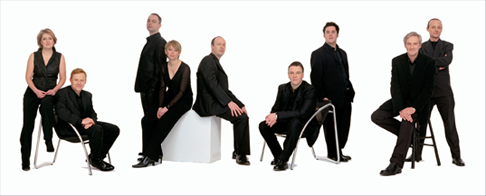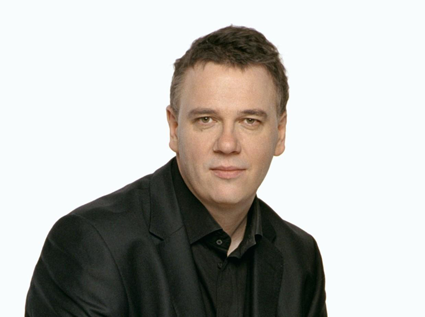There was a sell-out audience for this first Chamber Music Prom of the 2015
season, at the Cadogan Hall in South Kensington, and the early music
specialists The Cardinall’s Musick, directed by Andrew Carwood, delighted
with a compelling performance of Latin and English motets and anthems by
Tallis.
Fittingly, the Cadogan Hall began its life as a church. Established in
1907 as a New Christian Science Church, a declining congregation led to its
closure in 1996 but it was purchased by the Cadogan Estate in 2000 and
re-furbished as a concert hall four year later. Careful attention was paid to
the environmental and performance acoustic during the refurbishment; and, if
the resonance is not quite equal to that of the Reformation churches and
cathedrals in which Tallis’s sacred compositions were first heard, the
Cardinall’s Musick sang with full tone which reverberated richly, as they
illuminated the diversity of Tallis’s vocal textures. Noteworthy too was
the way in which individual voices emerged from the polyphonic ensemble, as
Carwood adeptly maintained an excellent balance between soloists and the
collective. His fluid, easy direction allowed the contrapuntal forms to
evolve organically while sustaining forward momentum. And, although the Hall
seats 950 people, the ensemble managed to create a surprising intimacy, drawing
the listener into the performance, the sensitivity and dignity of which
reminded one of the original function of these compositions - to express and
inspire devotion.
 The Cardinall’s Musick
The Cardinall’s Musick
The opening work ‘Videte miraculum’ (the responsory for Candlemas) took
a little while to settle, perhaps because of the strange dissonances which
characterise its opening point of imitation and its frequent alternations
between soloist, solo groupings and full choir. But, the emergence of the
unadorned chants between the choral sections were expressive and the
multi-voice responses created energy as parts of the chant were repeated,
blossoming in tone. The motet ‘Suscipe quaeso’ developed from the
solemnity of its narrow-compassed beginnings into a stunningly lavish,
beautifully balanced rhetorical appeal, and the repeated questions of the
second part were absorbingly insistent. Perhaps there might have been more
emphasis placed on the metrical and harmonic oddities of the brief ‘O nata
lux de lumine’, though the concluding phrase was characterised by a beautiful
simplicity and glow. In the 5-part ‘O salutaris hostia’ the short melodic
ideas developed with vitality. The passing of the imitative motifs from the
highest voice to the lowest created a sense of expanse, as the text expressed
hope of heavenly salvation, while the intricate appeals for strength in the
face of earthly enemies and woes in the latter part of the motet were
elucidated with clarity, building to invigorating repetitions of the final
phrase. ‘O Sacrum Convivium’ was utterly compelling in the way that the
close imitation built in intensity while still remaining airy and lucid.
There were English anthems too, beginning with the 4-part ‘O Lord, give
thy holy spirit’. Here, I’d have liked a little more emphasis on the
harmonic nuances which underscore the textual meaning. However, the
consistency of tone and intonation in the opening section of ‘Hear the voice
and prayer’ made for a powerful entreaty, while the more extended sequential
imitation of the appeal ‘That thine eyes may be open toward this house’ and
the elision into the final prayer, ‘And when thou hear’st, have mercy upon
them’, was persuasive. ‘Why fum’th in fight?’ was one of the works
that Tallis contributed to the Psalter prepared by the Archbishop of
Canterbury, Matthew Parker, in 1567, but is better known today as the melody of
the work it inspired: Vaughan Williams’s Fantasia on a Theme of Thomas
Tallis. The Cardinall’s Musick made the text dramatic, blending their
voices beautifully, and the modal harmonies were powerfully expressive,
stripped of some of the sentimentality which can colour Vaughan Williams’s
work.
Contrast and complement was provided by another composition inspired by
Tallis. Though it takes its name from Thomas Wolsey (the Roman Catholic
Cardinal and Lord Chancellor who rose to eminence during the reign of Henry
VIII before falling from favour when he failed to satisfy the King’s
political and matrimonial whims), the Cardinall’s Musick frequently turns its
attention to music of its own day, and has given premieres of works by composer
such as Michael Finnissy and Judith Weir. On this occasion it presented the
premiere of Cheryl Frances-Hoad’s ‘From the Beginning of the World’, a
composition for 8 voices which takes it text from the ‘German Treatise on the
Great Comet of 1577’ by Tycho Brahe (1546-1601). Speaking in the Hall to
BBC Proms presenter Petroc Trelawny, Frances-Hoad explained that she had looked
for a text which was representative of Tallis’s age but also spoke to our own
times: the Great Comet was interpreted as heralding an apocalypse, a sign of
God’s displeasure at man’s sinfulness, but also as a sign of rebirth, an
opportunity to repent: ‘It thus behoves us to use well our short life here on
earth, So that we may praise him for all eternity’ - a message that
Frances-Hoad suggested modern politicians, and indeed we all, might do well to
remember.
The work pays obvious musical homage to Tallis, with its solo chant-like
lines which bloom in melismatic and imitative expansion, its rhythmically
complex and diverse responses to the English text, the use of the tritone to
suggest the dark and satanic, and the employment of contrapuntal devices such
as double canons. It is an exciting and grippingly dramatic work, with its
combinations of Latin and English text, and constant re-calibrations of the
vocal groupings with solo exclamations, ‘Peccavi’ - ‘I have sinned’
- and questions, ‘But what do such unnatural births mean?’, demanding our
attention. There was also a strong sense of hope and regeneration, as with
the suggestion that ‘Something new can be generated in the heavens’, a line
in which strange, close dissonances expand in tessitura, blossoming in rich
melisma and shimmering harmonies which stirringly evoke the celestial. The
Cardinall’s Musick were more than equal to the significant technical
challenges, as soloists and as an ensemble: the intonation in the several
unison and octave passages was excellent. Carwood controlled the complexity
and animation of the final phrases superbly, leading his singers to a swift but
ecstatic close.
After such captivating and exciting text-setting, Tallis’s 40-voice motet
for eight five-part choirs, ‘Spem in alium’, was a fitting conclusion to
the concert. The supplemented forces of the Cardinall’s Musick found an
incredible richness and variety of sonority: the sense of spatial expanse, the
fullness of resonance, the homogeneity of vocal tone, the rhythmic tautness and
the overall vivacity and eloquence were inspiring.
Claire Seymour
Programme and performers:
Tallis: ‘Videte miraculum’, ‘O Lord, give thy Holy Spirit’,
‘Hear the voice and prayer’, ‘Why fum'th in fight?’, ‘Suscipe
quaeso’, ‘O nata lux de lumine’, ‘O sacrum convivium’, ‘O salutaris
hostia’; Cheryl Frances-Hoad: ‘From the Beginning of the World’ (world
premiere); Tallis: ‘Spem in alium’. The Cardinall’s Musick. Andrew
Carwood, director. Cadogan Hall, London, Monday 20th July 2015. BBC
Proms: Proms Chamber Music 1.

